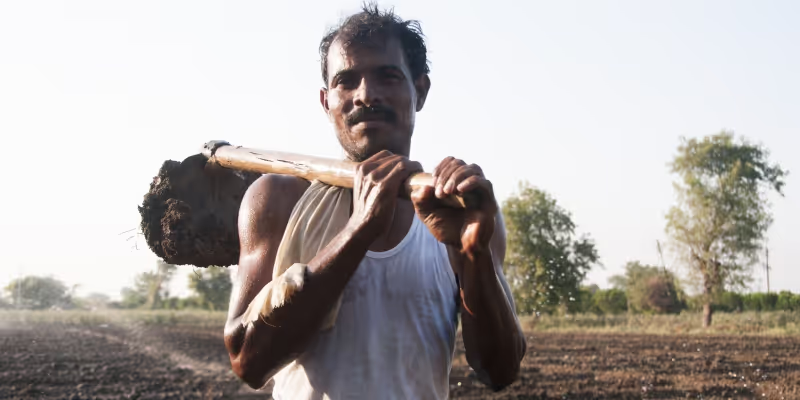Need of the hour for farmers is income certainty, not minimum support prices
Startups, the government, and academia will have to work in cohesion to fix the agriculture sector in India.

On October 6, Prime Minister Modi addressed the nation regarding GST changes, which give farmers absolutely nothing to rejoice over as technologies like shade nets and greenhouses, which can protect them from climate risk, continue to be taxed 18 percent GST. On the one hand, the government aims to double farmers’ income by 2022 but on the other is doing nothing to encourage technologies that will help in that process.
What is the farmers’ real problem? What do they really need? Who can make their lives better? What actions are needed today?
Let’s try to understand the farmers’ journey by analysing the life of Buchamma from Mulugu, Telangana. She has a soil health card but doesn’t use it to decide seed or soil nutrition. She goes to the bank, where, instead of availing a loan for her complete agricultural requirements, she takes whatever amount the official gives her as she knows that she can borrow the remaining sum from the local moneylender. She purchases medicines suggested by a shopkeeper selling pesticides. We don’t know whether that shopkeeper ever learnt the science of agriculture. Fighting excess heat, excess rains, pests, and other climatic extremities, if she gets a harvest, she sells at a price quoted by the buyer and walks back home to start the next season. India has more than 100 million Buchammas, almost all of whom fail almost all the time.
Gone are the days when we could talk just about minimum support prices, interest subsidies, seed subsidies, etc. For Buchamma, we need to go one step further. We need to talk about minimum income for farmers. Farming as they are for their livelihood, farmers naturally wish to have reliable incomes.
But who can assure farmers of reliable monthly incomes? The key is to create innovative products and services tailored for them, armed with a thorough understanding of what they really want and need, and driven by the ruthless pursuit of creating a permanent path out of poverty. The government should support startups that create solutions right from soil analysis to produce marketing. Such startups must look at farming in a holistic way and should work like the farmers’ trusted friends at every step. The fight to create income certainty for farmers is an extraordinary opportunity for entrepreneurs, investors, and corporates that will result not only in vibrant, growing businesses but also better lives for our farmers.
Green Agrevolution in Bihar has an end-to-end model for farmers. Soil testing, crop planning, agri input, farmers’ training, crop advisory based on input purchased, relevant information, and market linkage of farm produce are some of the services it offers. It currently serves 16,000 farmers.
Unfortunately, players with a focus on income certainty for farmers are few because this involves a lot of work and commitment. Such businesses often take much longer to break even, but they create a far deeper impact. In the initial years, there is a need for soft capital like grants to create scalable business models at a later date. Income certainty for farmers is not just an act of charity but a great value proposition that can solve real problems for them. So, if done well, it can be a fantastic business model with good scalability.
Instead of short-term measures likes loan waivers, what are the three things the government can do to encourage startups in this space?
- Exempt such startups from GST
- Exempt such startups from Income tax for 10 years
- Create a dedicated fund out of Krishi Kalyan Cess to invest (grants, equity, or debt) into agri startups focused on end-to-end solutions for farmers.
Promising governmental and philanthropic efforts to end farmer poverty have not reached scale because they lack the incentives of the market to attract massive resources. Making agriculture work is perceived as an impossible task by many. The most audacious explorers always come across as unrealistic until they succeed in doing what was previously thought impossible. Startups, the government, and academia have to work in cohesion to make the impossible possible. While Elon Musk works towards sending people to the red planet by 2024, let's target making farming a profitable profession on the blue planet.
The views expressed by the authors are their own and do not necessarily reflect that of YourStory.







